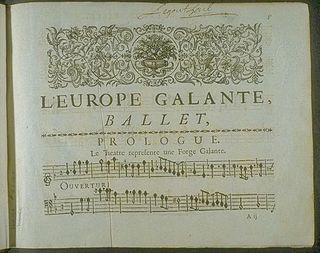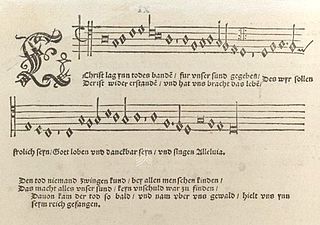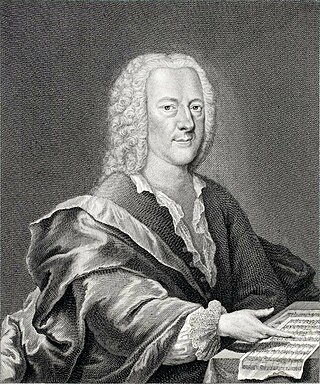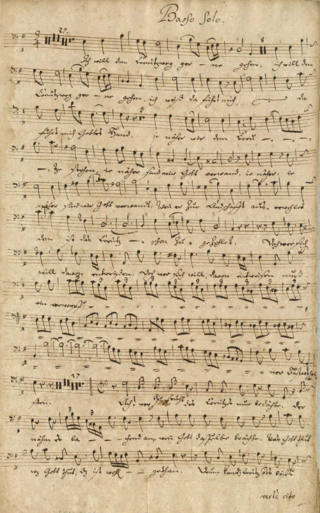
Georg Philipp Telemann was a German Baroque composer and multi-instrumentalist. Almost completely self-taught in music, he became a composer against his family's wishes. After studying in Magdeburg, Zellerfeld, and Hildesheim, Telemann entered the University of Leipzig to study law, but eventually settled on a career in music. He held important positions in Leipzig, Sorau, Eisenach, and Frankfurt before settling in Hamburg in 1721, where he became musical director of that city's five main churches. While Telemann's career prospered, his personal life was always troubled: his first wife died less than two years after their marriage, and his second wife had extramarital affairs and accumulated a large gambling debt before leaving him.
Passion, the Passion or the Passions may refer to:
"Oh, My Darling Clementine" is a traditional American Western folk ballad in trochaic meter usually credited to Percy Montross (1884), although it is sometimes credited to Barker Bradford.

In music, galant refers to the style which was fashionable from the 1720s to the 1770s. This movement featured a return to simplicity and immediacy of appeal after the complexity of the late Baroque era. This meant simpler, more song-like melodies, decreased use of polyphony, short, periodic phrases, a reduced harmonic vocabulary emphasizing tonic and dominant, and a clear distinction between soloist and accompaniment. C. P. E. Bach and Daniel Gottlob Türk, who were among the most significant theorists of the late 18th century, contrasted the galant with the "learned" or "strict" styles. The German empfindsamer Stil, which seeks to express personal emotions and sensitivity, can be seen either as a closely related North-German dialect of the international galant style, or as contrasted with it, as between the music of Carl Philipp Emanuel Bach, a founder of both styles, and that of Johann Christian Bach, who carried the galant style further and was closer to classical.

Salem's Lot is a 1979 American two part horror miniseries television adaptation of the 1975 horror novel 'Salem's Lot by Stephen King. Directed by Tobe Hooper and starring David Soul and James Mason, the plot concerns a writer who returns to his hometown and discovers that its citizens are turning into vampires. Salem's Lot combines elements of the vampire film and haunted house subgenres of horror.

Psalm 98 is the 98th psalm of the Book of Psalms, beginning in English in the King James Version: "O sing unto the Lord a new song; for he hath done marvellous things". The Book of Psalms starts the third section of the Hebrew Bible, and, as such, is a book of the Christian Old Testament. In the slightly different numbering system in the Greek Septuagint version of the Bible, and in the Latin Vulgate, this psalm is Psalm 97. In Latin, it is known as "Cantate Domino". The psalm is a hymn psalm, one of the Royal Psalms, praising God as the King of His people. Like Psalms 33 and 96, it calls for the singing of "a new song".
Raver or ravers may refer to:
Of Georg Philipp Telemann's surviving concertos, his Viola Concerto in G major, TWV 51:G9 is among his most famous, and still regularly performed today. It is the first known concerto for viola and was written circa 1716–1721. Telemann focused on composing for lesser-known instruments, resulting in the composition of this Viola Concerto. Telemann's Concerto for Viola represents a major Baroque concerto, as he explored the soloistic sound of the instrument, allowing it to be viewed as more than just an ensemble instrument. Unlike J.S. Bach and Vivaldi’s standard concerti of three movements, Telemann’s Concerto in G major for Viola contains four movements, and follows sonata da chiesa form, alternating between the tutti and solo sections, a common practice during this period.

The ancient legend of Orpheus and Eurydice concerns the fateful love of Orpheus of Thrace for the beautiful Eurydice. Orpheus was the son of Apollo and the muse Calliope. It may be a late addition to the Orpheus myths, as the latter cult-title suggests those attached to Persephone. It may have been derived from a legend in which Orpheus travels to Tartarus and charms the goddess Hecate. The subject is among the most frequently retold of all Greek myths, being featured in numerous works of literature, operas, ballets, paintings, plays and more recently, films and video games.

"Forbidden Colours" is a 1983 song by David Sylvian and Ryuichi Sakamoto. The song is the vocal version of the theme from the Nagisa Oshima film Merry Christmas, Mr. Lawrence. It appears on the film's soundtrack album and was released as a single on Virgin Records in 1983.

"Christ lag in Todesbanden" is an Easter hymn by Martin Luther. Its melody is by Luther and Johann Walter. Both the text and the melody were based on earlier examples. It was published in 1524 in the Erfurt Enchiridion and in Walter's choral hymnal Eyn geystlich Gesangk Buchleyn. Various composers, including Pachelbel, Bach and Telemann, have used the hymn in their compositions.

Don Quichotte auf der Hochzeit des Comacho, TVWV 21:32, is a one-act comic serenata by Georg Philipp Telemann. The libretto by the student poet Daniel Schiebeler is based on chapter 20 of volume 2 of Cervantes's novel Don Quixote. The opera premiered on 5 November 1761 in Hamburg. When first performed, it was given the title: Don Quichotte auf der Hochzeit des Comacho; later it was also known as Don Quixote der Löwenritter.

A church cantata or sacred cantata is a cantata intended to be performed during Christian liturgy. The genre was particularly popular in 18th-century Lutheran Germany, with many composers writing an extensive output: Stölzel, Telemann, Graupner and Krieger each wrote nearly or more than a thousand. The best known examples, however, are those of Johann Sebastian Bach, whose output stands out not by quantity but by the high level of expertise and craftmanship which they showcase.

Water Music, TWV 55:C3, is the common name of an orchestral suite by the German Baroque composer Georg Philipp Telemann, with the full title Hamburger Ebb' und Fluth.
Jauchzet dem Herrn alle Welt is a three-movement pasticcio motet for double SATB choir. It includes music by Georg Philipp Telemann and Johann Sebastian Bach. The text of the motet is a German paraphrase of Psalm 100.
The Telemann-Werke-Verzeichnis, abbreviated TWV, is the numbering system identifying compositions by Georg Philipp Telemann, published by musicologist Martin Ruhnke.
Eggy or Eggie may refer to:

Johann Balthasar König was a German Baroque composer, especially of hymn melodies, having published a hymnal with 1,913 melodies. He was the church musician at Frankfurt's main Protestant church, the Katharinenkirche, and the town's Kapellmeister. He was also closely associated with Georg Philipp Telemann.

Georg Philipp Telemann composed the church cantata Ich will den Kreuzweg gerne gehen, TWV 1:884, for bass, violin and continuo for the 21st Sunday after Trinity. He used a text by Erdmann Neumeister.











